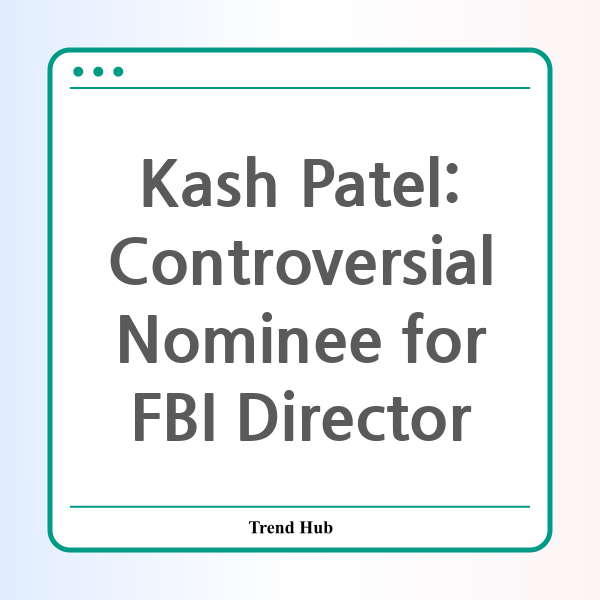* This website participates in the Amazon Affiliate Program and earns from qualifying purchases.

As the Senate gears up for the final confirmation vote of Kash Patel as FBI Director, the political landscape intensifies with both support and opposition clashing in a high-stakes showdown. Will Patel emerge as the leader needed for the FBI's critical tasks, or will he falter under the weight of political scrutiny?
In a recent Senate vote, Patel's nomination faced a narrow margin of 51-47, marking a significant moment in this unfolding drama. The confirmation reflects a party line split, which has been starkly highlighted by Senator Susan Collins' announcement of her opposition. Collins, a prominent Republican voice, argues that Patel's political history may compromise the impartiality requisite for an FBI Director. This sentiment resonates with many Democrats who express concerns that Patel may prioritize loyalty to the president over the independence expected from such a key role in law enforcement.
Patel, who served in the Trump administration as Deputy Assistant to the President and on the National Security Council, has a record that divides opinion sharply. Supporters tout his commitment to national security and defense, emphasizing that his previous roles have equipped him to manage the complexities of the FBI. However, critics cite Patel's controversial statements and his apparent alignment with Trump's politically charged agenda as grounds for disqualification, fearing a potential shift in the FBI's traditionally non-partisan operation.
Leading up to this confirmation, Patel’s confirmation hearing before the Senate Judiciary Committee showcased a decisive moment where he addressed troubling allegations concerning his past remarks. During his testimony, Patel asserted his commitment to law enforcement and publicly distanced himself from any narratives promoting violence, especially in reference to the January 6 Capitol events. "I have always rejected any violence against law enforcement," he stated firmly, underlining his belief in the FBI's mission.
This tension surrounding Patel's nomination is underscored by the broader implications for the FBI and its future direction. The fear among opponents is that Patel's confirmation could alter the bureau's operational ethos, potentially politicizing investigations or leading to biased enforcement of laws. The critical nature of the FBI's role, especially in today's polarized environment, amplifies the stakes of this confirmation process.
The final confirmation vote, scheduled for today, may very well set the tone for future nominations and political maneuvering within the Senate. Should Patel succeed, he will need to navigate a labyrinth of ongoing scrutiny while striving to maintain the trust of the American people and the integrity of the FBI.
As we watch this unfold, we pose a vital question to our readers: What does Kash Patel’s nomination signify for the future of the FBI, and how will it impact the political landscape moving forward? Only time will tell, but this moment is poised to be a pivotal point in determining the balance of power between the executive branch and our federal law enforcement agencies.
In conclusion, Kash Patel's path to becoming the next FBI Director is emblematic of the larger ideological divide present in today's political climate. With a final vote looming, one can only anticipate the discussions and ramifications that will resonate across the nation, reflecting on the delicate balance of justice and politics.
* This website participates in the Amazon Affiliate Program and earns from qualifying purchases.